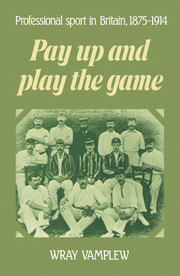Book contents
- Frontmatter
- Contents
- List of tables
- Preface
- Acknowledgements
- A guide to prices, 1870–1914
- Part I An overview
- Part II The development of professional gate-money sport
- Part III Sport in the market place: the economics of professional sport
- Part IV Playing for pay: professional sport as an occupation
- Part V Unsporting behaviour
- Part VI A second overview
- Appendices
- Notes
- Bibliography
- Index
Part II - The development of professional gate-money sport
Published online by Cambridge University Press: 16 February 2010
- Frontmatter
- Contents
- List of tables
- Preface
- Acknowledgements
- A guide to prices, 1870–1914
- Part I An overview
- Part II The development of professional gate-money sport
- Part III Sport in the market place: the economics of professional sport
- Part IV Playing for pay: professional sport as an occupation
- Part V Unsporting behaviour
- Part VI A second overview
- Appendices
- Notes
- Bibliography
- Index
Summary
The future chronicler of the Victorian era, when noticing social changes, will find himself compelled to devote much of his space to the enormous increase of sport and athletic games. Sixty years ago boxing was dying, as duelling had perished shortly before, by a discreditable death. Golf was only known in Scotland, and like curling, the other favourite game of Scotchmen, showed no sign of sallying forth to conquer other lands. Cricket was just entering a more scientific stage, but no one could have predicted the ascendancy it has since gained. The University Boat Race was not yet in its infancy, and ten years afterwards, instead of the serried thousands who now repair to the banks of the Thames to see it rowed, a few hundreds of University men galloped abreast of the competitors, and it was esteemed amusing if they succeeded in driving into the water the thin fringe of lookers-on who occupied the banks. Football had not migrated from the boys' playground. In certain old towns by ancient custom at Eastertide balls were unscientifically kicked along the streets to the danger of windows and disgust of quiet people. As for football attaining its present development, such a thought had entered no one's head.
Quarterly Review, clxxxviii, 1898, p.419- Type
- Chapter
- Information
- Pay Up and Play the GameProfessional Sport in Britain, 1875–1914, pp. 19 - 20Publisher: Cambridge University PressPrint publication year: 1988



